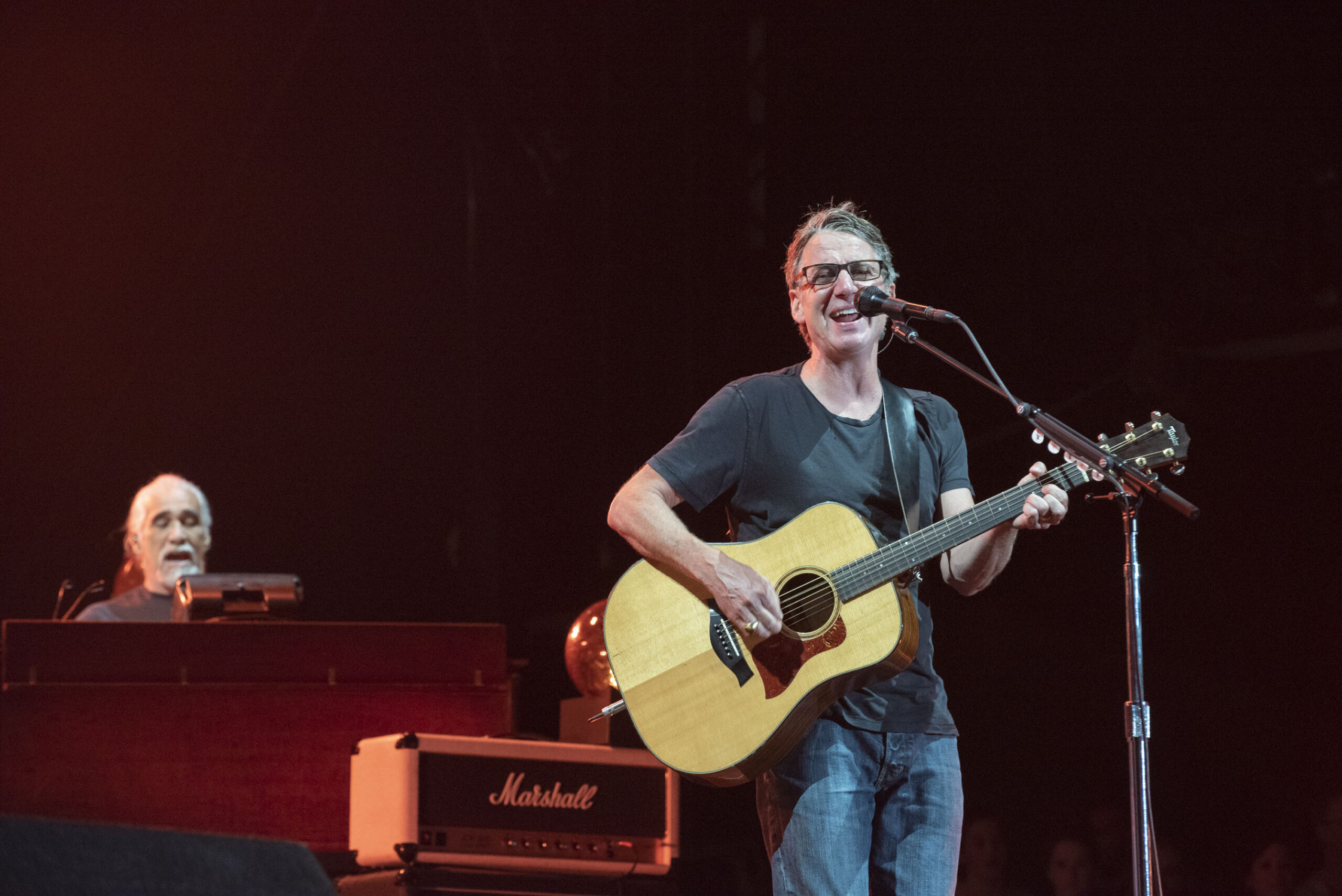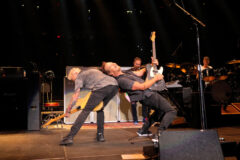It’s the proverbial calm before the storm at Pearl Jam‘s Seattle headquarters at the moment, as the Rock and Roll Hall of Famers prepare for the April 19 release of their 12th album, Dark Matter, and a supporting world tour kicking off May 4 in Vancouver. First, they just need to learn how to play those new songs again. “I’m getting the basics going on my own,” founding guitarist Stone Gossard tells SPIN over the phone. “Then, [guitarist] Mike [McCready] and I will start playing some guitar together and mapping things out.”
While fans await Dark Matter, Pearl Jam already have their biggest hit in years on their hands with the album’s title track, which has topped multiple different Billboard rock charts. Its urgent, aggressive sound was inspired by Grammy-winning producer Andrew Watt, a lifelong Pearl Jam fan who cultivated a friendship with frontman Eddie Vedder over a period of years before going on to produce his 2022 solo album, Earthling. Vedder got such a kick out of the spontaneity of the experience that he encouraged Pearl Jam to come try it too. Sure, 20 months passed between separate 10-day writing and recording sessions at Watt’s Beverly Hills, Ca., home studio in July 2021 and Rick Rubin’s Shangri-La in Malibu in March 2023, but Pearl Jam work in mysterious ways. Indeed, sometimes the long road to completing an album must be taken, even if the journey on it is unexpectedly quick.
Watt, who earned plaudits for his recent work with the Rolling Stones, Ozzy Osbourne and Iggy Pop, pushed Pearl Jam to lean into their collective natural songwriting instincts while also coloring the follow-up to 2020’s Gigaton with a modern production touch rarely heard on their prior albums. The songs were hatched with Gossard, McCready, Vedder, bassist Jeff Ament and drummer Matt Cameron all together in a room, an approach they’d often previously set aside in favor of bringing in nearly complete demos made on their own time. “There have been different times where each of us individually wanted to break things and move things around and try new stuff. The trick is trying to get that all to align in the same moment, and this was our moment,” Gossard says.
The result is an album with something to love for every iteration of Pearl Jam fan, from kick-ass rockers such as the opening one-two punch of “Scared of Fear” and “React, Respond” to the open-hearted, acoustic-flecked ballad “Wreckage” and the swaggering grooves of “Waiting for Stevie,” a “Breath”/”State of Love and Trust”-style throwback Vedder and Watt started writing while waiting hours for Stevie Wonder to show up and record a guest turn on Earthling. There are songs about the challenges of parenting (“Something Special”), being visited by Laurel Canyon legends in a dream (“Won’t Tell”) and trying to make genuine human connections at a time when such a thing seems more difficult than ever (“Setting Sun”). You’ll hear a beguiling synth intro one moment and McCready playing some serious “Yellow Ledbetter”-ish blues guitar the next — a sonic kaleidoscope of Pearl Jam past, present and future over the course of 48 minutes.
Below, Gossard walks SPIN through the making of Dark Matter, collaborating with Watt and what new doors it has opened for a band nearly 34 years into their still-evolving career.
Let’s talk about the unusual origins of this album. My understanding is that Ed was working on his own at Andrew’s studio in the summer of 2021 and got so inspired that he asked the other Pearl Jam members to fly down and join him.
That sounds about right. I know that he was full-on making his solo record already and maybe close to even being done with it. So I think he probably went through that process with Andrew and then was like, this is fun. I don’t know if this is gonna work for Pearl Jam, but let’s just jump into Andrew’s studio, which has got, you know, everything. Like, come to L.A. Don’t bring anything. Come. Just play. It’s not our normal M.O., which is great. That’s what was exciting to all of us. Andrew is a guitar collector, so everything you could ever want to try to play is there. You’re diving in headfirst to a new situation that you’re excited about because one, Ed’s excited about it. And two, you don’t know Andrew or anything about him, but it’s different. What’s the worst that can happen? It doesn’t work out, or it shakes something different loose.
Is it fair to say there was a time when you guys would have been less apt to do something like that, especially on such short notice?
We were comfortable because of Ed having already said, I think this is a good choice. Let’s experiment together. Gigaton was made over a long period of time. It was done from individual demos, using the parts that were raw and rough from them that we loved, but also adding onto them. It was a cool process, but this was the anti-that. This was, you barely bring in a riff, but in 30 minutes, here’s two or three chords you might not have even known how to play but they sound cool in the bridge. We encouraged Matt Cameron to be more and more aggressive. Let’s make these feel like they’re being enacted right in the moment. That was what was exciting about the process with Andrew.
At first, we were there for probably 10 days. We knocked those first two songs out and I think we recorded the basics for ‘Waiting for Stevie’ on day two or three. We recorded three or four more quickly like that. As we got home and listened, some of those started to fall back into being not as urgent and more cerebral … maybe more arranged. They didn’t have the excitement we got from that first batch, where it was like everybody jumping off the cliff together. We got what we felt like was maybe half a record done or close to it, and then we hung. Lots of things went on. Ed went on tour. I don’t know whether Andrew finished with Ozzy first and then made the Rolling Stones record, but he’s constantly working. There was a scheduling thing where we just didn’t get back together again right away. The next round was a year later and we said, okay, we’re gonna finish the record. We’ve got two weeks at Shangri-La.
At that point, were you armed with new bits you were hoping to turn into fresh songs?
I’m sure everyone had some riffs and some arrangements. The thing is, the more it’s arranged and you’re attached to it, the harder it is to work other suggestions in. The way we were working really was, everybody in the room, let’s pull something out and really work it over together. In general, you were better off having a sketch than you were a complete idea. People getting invested in a song and, reacting and then hearing their own parts in it was the alchemy making these songs come to life.
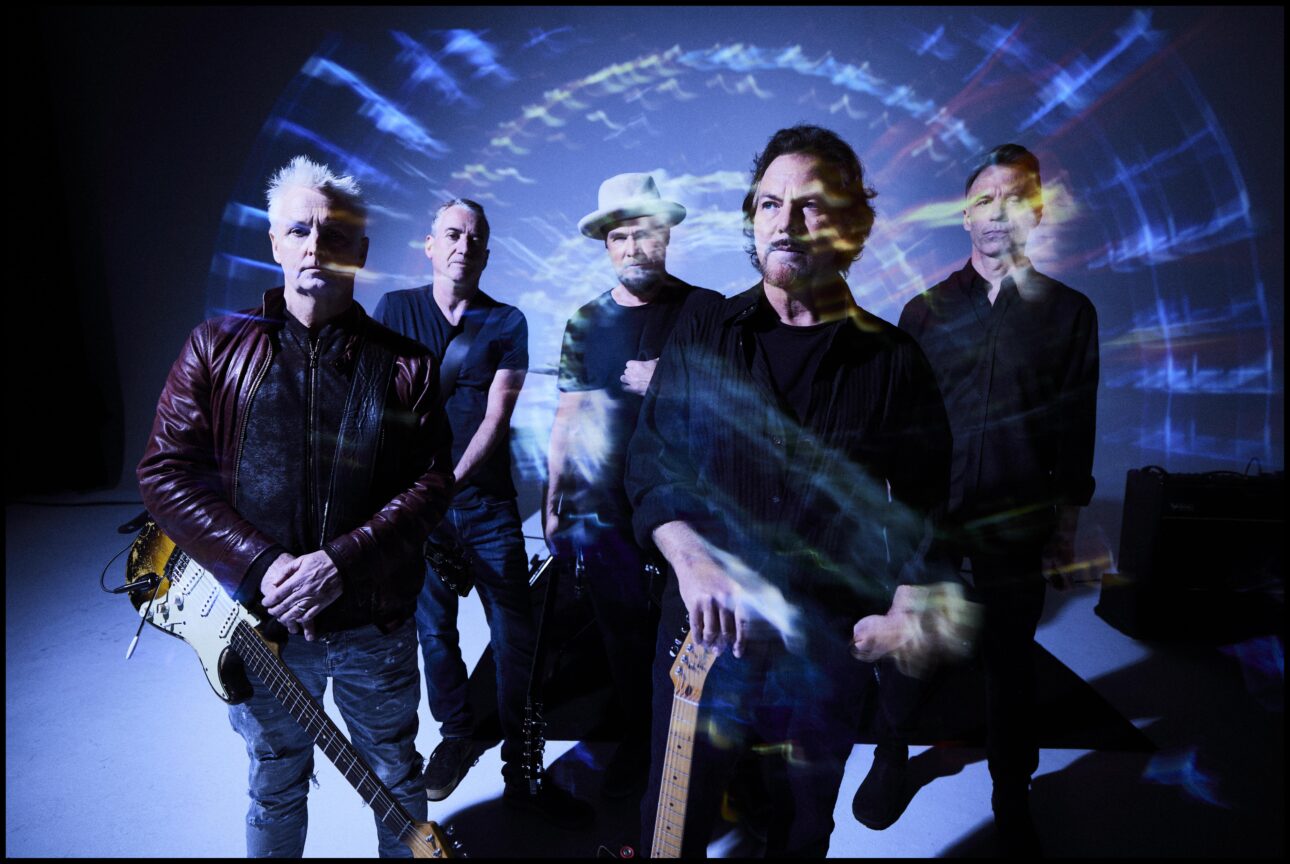
Had you ever set foot in Shangri-La before?
No. It’s a beautiful, beautiful spot and it sounded good. It had a pool table and no TVs. Andrew does things really pro. We had an amazing chef and we ate great food. We recorded for 10 days, and we got to listen to the old stuff. We were editing, like, this is a keeper, that one is a keeper. We got to the point where it was like, we need three more. We were scrambling and burning the candle on both ends, but it was also fucking great. It’s exactly what made sense for the band.
Let’s talk about Andrew. This is the first time where someone who’s such an overt fan, but also a music business professional, gets to have their hands on the wheel and even help Pearl Jam write songs. Did he encourage the band to do anything differently? Was he pushing you to rock more?
Subtly, there were things he would do, and he probably wouldn’t even talk to us about them, but we were playing through his gear. He’s genuinely a fan and was affected by the band at a young age. He’s also a great guitar player and a great engineer, and he’s manifesting on a high level — like, this is my dream. When I was a kid, I said that I was gonna make a Pearl Jam record, and now it’s happening. We’re all players in Andrew’s bigger narrative going on, which is him collecting his childhood favorite bands.
In the past, [longtime producer] Brendan O’Brien would help us with a chord or two every once in a while and be the outside ear. It’s hard because even if you hear that something’s not quite working, it’s better that it comes from somebody who’s not in the band. Andrew had a guitar on the whole time. We would all play together, and some of his playing is on the album. For the most part, he was feeling the song with us and experiencing it as it goes down. He loves our oddball, idiosyncratic things, but he also pushed us to get to the point, to be aggressive, to be ourselves and not shy away from who we are.
Do you recall some of the things that came out of the first round of plugging in and messing around?
‘Scared of Fear’ and ‘React, Respond’ were done on the first day. We just did those one, two.
Let’s go through all the songs. ‘Scared of Fear’ sounds like a Stone riff. Is that yours?
Yeah, it was. It was a Stone two-parter, you know? It evolved. Ed was like, maybe this one part goes two times or three times. We just sat down and hammered it out and it was recorded during the first day.
‘React, Respond’ has some heavy Police and Devo vibes.
Yeah, it’s the best. I love it because my part is so caveman on it. I’m just hitting those big open E’s throughout the verses. It’s so fun.
‘Wreckage’ dials down the aggressiveness temporarily, with shades of Tom Petty.
Andrew and Ed worked that out together. One morning, we came in and they had something going on. That was definitely a Shangri-La track. That one probably has the biggest build for me personally, in terms of hearing it at first and thinking, it’s kind of an Ed song. I wasn’t quite aware of its potency until later. Andrew encouraged me to play this little harmonic, acoustic part almost like a Cure melody. I’ve been playing along with the song to relearn it and I’m really looking forward to playing it live. It’s a really powerful lyric and I think we did a really great job of taking something and really pushing it to its limit.
‘Dark Matter’ showcases Matt Cameron and has some tasty riffs in the vein of AC/DC and Led Zeppelin. How did this song come to life?
Matt comes into the studio and tunes up his drums every morning. 90% of the time, he’ll start playing a beat just to warm up. When we heard him play what became ‘Dark Matter,’ we were like, oh my god, that’s fucking classic. We asked him to let us record it and we made a little loop. Jeff and I took that home and both of us were writing to it. We both came in the next day and played our parts. We needed a bridge, and then Mike had a bridge. We had that song in literally 24 hours, and I look at it as the lighthouse of what’s possible for the band in terms of changing our writing style and really honoring the rhythm first and foremost. I look at that as a Matt Cameron song, because I don’t know that I’ve heard a drum beat start a song like that. It feels unique. Ed’s lyric is very timely, even though I don’t know exactly what it means. It just feels good to hear somebody say that. I love that it’s really hard rock but it doesn’t feel gratuitous or fake. It feels real to me. I wrote the little [hums the descending riff in the song’s pre-chorus], and everybody’s got something in that song that’s special.
There’s a guitar effect similar to what was used on [the 2002 Pearl Jam song] ‘You Are.’
Yeah, it’s got that Eventide tremolo guitar effect on my part throughout it. It’s bouncing around in the rhythm and creating a backbeat.
‘Won’t Tell’ is like Pearl Jam refracted through the Cure or U2.
It’s really special. Jeff wrote that song. He told me he had a dream about Joni Mitchell, and maybe even Neil Young was there. She said something about the lyric ‘waiting for your message to come. Can you heal? Can you feel the chains in my heart?’ Then Ed took all of that and we reinterpreted the whole thing. It evolved quite a bit from where Jeff had it, but we knew that lyric and we knew the spirit of it. We started going down the path of those 16th notes, with Matt playing that hi-hat groove that’s reminiscent of the Cure or U2 where you groove into a beat and the drums become a little bit more of a backbeat. Ed’s vocal is just soaring. It’s gorgeous. It’s one of those songs that’s easy to play. It kind of plays itself. It really does have a different quality to it. It’s a real amalgamation of, being inspired by a dream, starting with a rudimentary arrangement and then us taking it and completing it. It was really fun to do.
‘Upper Hand’ starts off somewhat resigned, a la ‘All Those Yesterdays or ‘Parachutes,’ but has quite a build at the end.
I had those two parts as a starting point, but that song definitely evolved too. Ed helped with the verses and they really changed a lot. The verses remind me of Bob Dylan or something like that, where it’s not so much about the melody but the delivery. I love how Ed can be so many different people and you can hear his influences, and yet it’s still him. He takes and picks from so many different places.
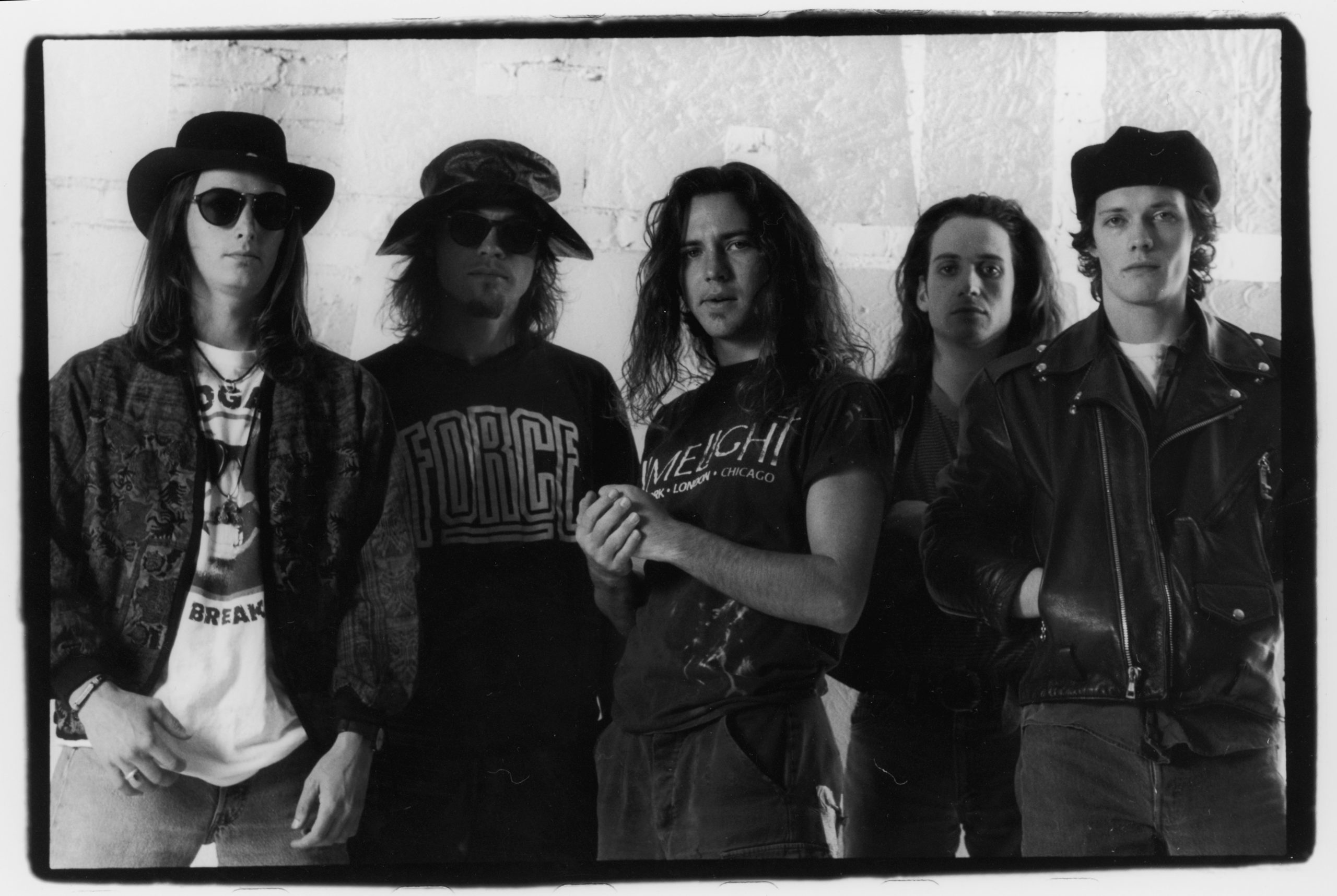
Even though it didn’t start with the other band members in the room, ‘Waiting for Stevie’ sounds more like early or Singles-era Pearl Jam than just about anything I’ve heard from the band in a long time.
Yes, and I think Andrew had more to do with that song than any song on the record because in a sense, it’s almost a tribute to Soundgarden. It has a riff that gives Matt Cameron the opportunity to be as great as we know him to be. I think that drum fill coming out of the bridge is probably one of the greatest drum fills of all time. There’s just no way you can’t make the Mötley Crüe sign. I love that song. It’s the way the bass line and the guitar line play against each other melodically. To me, it feels kind of like a hit, you know what I mean? I’ll be curious where it ends up sitting in the pantheon of favorites among Pearl Jam fans.
There’s a little snippet of something after ‘Stevie’ and before the next song, ‘Running.’ What is that?
It’s a little segue now, but we worked on it as a song that was never finished from that first session. We all loved one particular part of it, which Jeff, Andrew and I tweaked a little bit. In the end, we just decided it should become a transition.
On ‘Running,’ it’s rare to hear a Pearl Jam song with this chant-y, gang vocal chorus. It just sounds like fun.
Jeff had the main parts for that one, and we worked it over as a band. I love the bridge. I don’t know what the hell those chords are that Mike’s playing, but it sounds original. It’s one of the last ones we recorded at Shangri-La, and it was fun to come up with one more uptempo song. Ed’s vocal dexterity here and on a few other spots on the album is just stunning. Same thing goes with that second verse of ‘React, Respond’ where he’s almost frickin’ rapping.
Ed previously said that [touring member] Josh Klinghoffer had a big hand in ‘Something Special.’
‘Something Special’ was recorded in that first session at Andrew’s house and those are Josh’s initial chords. We moved things around a little bit, but the song really came from him. I love that it’s a song about parenting and kids, but I also love that Josh Klinghoffer joins the band live on tour and also writes a song for the album. I just think that’s fuckin’ cool.
We’re in the home stretch. What can you tell us about ‘Got To Give?’
That’s an Ed song. It definitely has kind of a Who vibe, and it rocks. I have a little guitar lead in there that I really like a lot — a fun, melodic thing that happens at the end of the bridge. I’m looking forward to playing this song live.
‘Setting Sun’ is an epic closer. Did it naturally feel like the perfect way to end the album?
We were looking for a vibe that felt percussive and cool and a little bit hypnotic without trying to get to any huge destination, although I think we got there anyway. The mood is supposed to be this in-between state. This is another song that’s opening doors for us and I think we can do more of, without feeling like we have to get crazy.
The album has a vaguely unsettling ambient intro, which evokes the ‘Master/Slave’ intro and outros on Ten.
Jeff and Andrew came up with that. We wanted to open the album with ‘Scared of Fear,’ but that would have been a dead start to set the table. So, we built this little intro, and I’m sure Andrew was excited about having something that harkened back to Ten a little bit.
How are you feeling about incorporating this batch of material into the live shows?
I’m excited. I think everybody is, and our goal is to play a lot of new stuff. So, listen to the record, everybody. Know the material! We’re gonna play it. We’ll have some new production too. We’re working on something right now, so it will be a little bit of a different show.
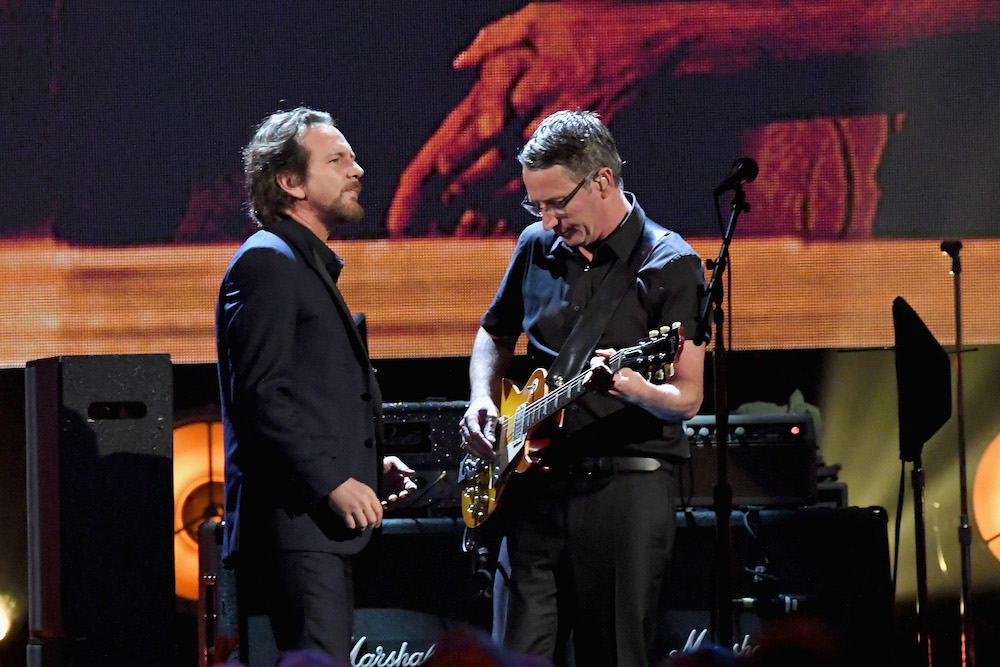
When Pearl Jam finally played again in 2021 after a three-year break, the shows were comparatively shorter than the three-hour-plus marathons from before the pandemic. Does that help the band stay fresh and not burn itself out?
Well, everyone’s almost 60 years old. So if you want us to keep doing this, we can’t do it the same way we did over the last 10 years or so. The length is gonna be a little bit shorter in general, but there will still be a lot of variety and we’re still going to take chances. We just might do that in different ways. We’ve been so fortunate that our fans have been so open to our whims and experimentations, even if sometimes they wish we’d play ‘Jeremy’ and instead we play a B-side not very well (laughs). They’ve grown to understand and even appreciate that. It’s not going to be a marathon every night, because we just can’t do that. Ed and Matt in particular are physically doing so much on stage.
Let’s close with this. What has the experience of making Dark Matter meant to you, and what might it lead to for the band moving forward?
I’m not racing to reflect, which should be the name of my new biography, but I’m looking forward to where it can go. I personally think that the experience of working with Andrew was fantastic and I would love another shot at making a record with him. The chemistry we had and continue to have with him is something worth exploring. He’s an astronaut. He likes to go out and try different ideas, but he also has a great sensitivity to the things he loves about this band, and will let us know if we’re not moving in a direction that feels authentic.
All the drifting we’ve done is important. Now, No Code is one of people’s favorite Pearl Jam records, but at the time, a lot of fans felt like, what is this? Where are they going? If we had worked with Andrew on our fourth record and continued to work with him, we might not have gone into some places that we needed to go. The timing of all of this is good though, because we’re still energized. We have a lot of perspective on how lucky we are to still be playing music and being creative together.

